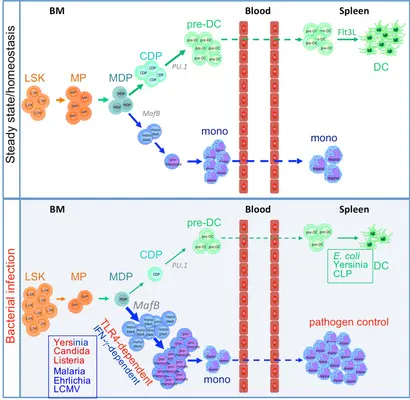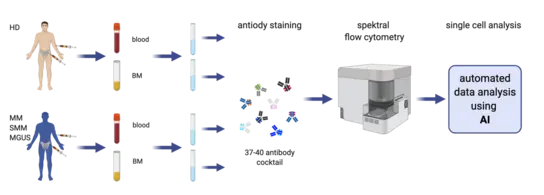Dendritic Cells in Infection and Cancer

apl. Prof. Dr. Stella Autenrieth
Group Leader


Host defense against microbial pathogens and cancer relies on the concerted action of both innate and antigen-specific adaptive immunity. Key features of the innate immune system include the ability to rapidly recognize pathogens or malignant cells and to signal the presence of danger to cells of the adaptive immune system. Dendritic cells (DCs) are critical for defense against infection and cancer. They are unique antigen-presenting cells that are able to recognize and respond to pathogens and inflammation by, among others, contributing to the initiation and regulation of T-cell responses. DCs consist of different subpopulations whose specific immunological functions in infections and cancer are not yet completely understood. Our group is therefore interested in elucidating the role of different DC subpopulations, their development and basic function in immune activation by bacterial infections, inflammation, and cancer to improve the basic understanding of DC function in disease but also the potential of DCs as targets for therapeutic intervention.
DCs develop from hematopoietic stem cells via DC-specific progenitors in the bone marrow (BM). Their numbers in the periphery are tightly regulated to ensure the balance between tolerance and immunity. However, in infections, as well as in cancers such as multiple myeloma (MM), the number of DCs is severely reduced, leading to an impaired immune response (Figure 1). Our research group focuses on the questions which factors impair the development of DCs in bacterial infections or in patients with MM and what are the consequences for the immune response.

Another focus of our group is the phenotyping of immune cells by spectral flow cytometry (AURORA from Cytek). With this method, currently about 40 proteins expressed on or in cells can be determined simultaneously, which allows e.g. the detailed characterization of all immune cells in the blood of patients during the course of clinical studies (Figure 2).
Team

-
-
-
Helene Herrmann
-
-
-
-
Dea Shala
Full Bibliography
Amon L, Vurnek D, Seichter A, Tchitashvili G, Kaszubowski T, Mroz M, Debeuf N, Vogler T, Küpper N, Rengarajan KR, Lächele L, Tochoedo NR, Baranska A, Autenrieth SE, Nimmerjahn F, Hildner K, Pfeffer K, Schraml BU, Heger L, Lambrecht BN, Lehmann CHK, Dudziak D.
Kruse S, Fricke LT, Zottnick S, Schlosser AK, Grabowska AK, Feidt E, Uhl P, Junglas E, Förster JD, Blersch J, Denner P, Günter M, Autenrieth SE, Fava E, Mier W, Kübelbeck A, Riemer AB.
Jordan MA, Morschl J, Autenrieth SE.
Günter M, Mueller KAL, Salazar MJ, Gekeler S, Prang C, Harm T, Gawaz MP, Autenrieth SE.
Mueller KAL, Langnau C, Harm T, Sigle M, Mott K, Droppa M, Borst O, Rohlfing AK, Gekeler S, Günter M, Goebel N, Franke UFW, Radwan M, Schlensak C, Janning H, Scheuermann S, Seitz CM, Rath D, Kreisselmeier KP, Castor T, Mueller II, Schulze H, Autenrieth SE, Gawaz MP.
Magalhães VG, Lukassen S, Drechsler M, Loske J, Burkart SS, Wüst S, Jacobsen EM, Röhmel J, Mall MA, Debatin KM, Eils R, Autenrieth S, Janda A, Lehmann I, Binder M.
Heger L, Hatscher L, Liang C, Lehmann CHK, Amon L, Lühr JJ, Kaszubowski T, Nzirorera R, Schaft N, Dörrie J, Irrgang P, Tenbusch M, Kunz M, Socher E, Autenrieth SE, Purbojo A, Sirbu H, Hartmann A, Alexiou C, Cesnjevar R, Dudziak D.
Langnau C, Janing H, Kocaman H, Gekeler S, Günter M, Petersen-Uribe Á, Jaeger P, Koch B, Kreisselmeier KP, Castor T, Rath D, Gawaz MP, Autenrieth SE, Mueller KAL.
Lutz MB, Ali S, Audiger C, Autenrieth SE, Berod L, Bigley V, Cyran L, Dalod M, Dörrie J, Dudziak D, Flórez-Grau G, Giusiano L, Godoy GJ, Heuer M, Krug AB, Lehmann CHK, Mayer CT, Naik SH, Scheu S, Schreibelt G, Segura E, Seré K, Sparwasser T, Tel J, Xu H, Zenke M.
Friedrich M, Hahn M, Michel J, Sankowski R, Kilian M, Kehl N, Günter M, Bunse T, Pusch S, von Deimling A, Wick W, Autenrieth SE, Prinz M, Platten M, Bunse L.
Rohlfing AK, Kolb K, Sigle M, Ziegler M, Bild A, Münzer P, Sudmann J, Dicenta V, Harm T, Manke MC, Geue S, Kremser M, Chatterjee M, Liang C, von Eysmondt H, Dandekar T, Heinzmann D, Günter M, von Ungern-Sternberg S, Büttcher M, Castor T, Mencl S, Langhauser F, Sies K, Ashour D, Beker MC, Lämmerhofer M, Autenrieth SE, Schäffer TE, Laufer S, Szklanna P, Maguire P, Heikenwalder M, Müller KAL, Hermann DM, Kilic E, Stumm R, Ramos G, Kleinschnitz C, Borst O, Langer HF, Rath D, Gawaz M.
Sauter M, Sauter RJ, Nording H, Lin C, Olbrich M, Autenrieth S, Gleissner C, Thunemann M, Otero N, Lutgens E, Aherrahrou Z, Wolf D, Zender L, Meuth S, Feil R, Langer HF.
Tune C, Hahn J, Autenrieth SE, Meinhardt M, Pagel R, Schampel A, Schierloh LK, Kalies K, Westermann J.
Bieber K, Günter M, Pasquevich KA, Autenrieth SE.
Langnau C, Rohlfing AK, Gekeler S, Günter M, Pöschel S, Petersen-Uribe Á, Jaeger P, Avdiu A, Harm T, Kreisselmeier KP, Castor T, Bakchoul T, Rath D, Gawaz MP, Autenrieth SE, Mueller KAL.
Mueller KAL, Langnau C, Günter M, Pöschel S, Gekeler S, Petersen-Uribe Á, Kreisselmeier KP, Klingel K, Bösmüller H, Li B, Jaeger P, Castor T, Rath D, Gawaz MP, Autenrieth SE.
Tune C, Meinhardt M, Kalies K, Pagel R, Schierloh LK, Hahn J, Autenrieth SE, Koch CE, Oster H, Schampel A, Westermann J.
Koeninger L, Armbruster NS, Brinch KS, Kjaerulf S, Andersen B, Langnau C, Autenrieth SE, Schneidawind D, Stange EF, Malek NP, Nordkild P, Jensen BAH, Wehkamp J.
Hahn J, Günter M, Schuhmacher J, Bieber K, Pöschel S, Schütz M, Engelhardt B, Oster H, Sina C, Lange T, Autenrieth SE.
Richardson JR, Armbruster NS, Günter M, Biljecki M, Klenk J, Heumos S, Autenrieth SE.
Richardson JR, Armbruster NS, Günter M, Henes J, Autenrieth SE.
Pagel R, Bär F, Schröder T, Sünderhauf A, Künstner A, Ibrahim SM, Autenrieth SE, Kalies K, König P, Tsang AH, Bettenworth D, Divanovic S, Lehnert H, Fellermann K, Oster H, Derer S, Sina C.
Wiehr S, Rolle AM, Warnke P, Kohlhofer U, Quintanilla-Martinez L, Reischl G, Autenrieth IB, Pichler BJ, Autenrieth SE.
Armbruster NS, Richardson JR, Schreiner J, Klenk J, Günter M, Autenrieth SE.
Dave MN, Silva JE, Eliçabe RJ, Jeréz MB, Filippa VP, Gorlino CV, Autenrieth S, Autenrieth IB, Di Genaro MS.
Drechsler-Hake D, Alamir H, Hahn J, Günter M, Wagner S, Schütz M, Bohn E, Schenke-Layland K, Pisano F, Dersch P, Autenrieth IB, Autenrieth SE.
Wiehr S, Warnke P, Rolle AM, Schütz M, Oberhettinger P, Kohlhofer U, Quintanilla-Martinez L, Maurer A, Thornton C, Boschetti F, Reischl G, Autenrieth IB, Pichler BJ, Autenrieth SE.
Münzenmayer L, Geiger T, Daiber E, Schulte B, Autenrieth SE, Fraunholz M, Wolz C.
Rolle AM, Hasenberg M, Thornton CR, Solouk-Saran D, Männ L, Weski J, Maurer A, Fischer E, Spycher PR, Schibli R, Boschetti F, Stegemann-Koniszewski S, Bruder D, Severin GW, Autenrieth SE, Krappmann S, Davies G, Pichler BJ, Gunzer M, Wiehr S.
Armbruster NS, Richardson JR, Schreiner J, Klenk J, Günter M, Kretschmer D, Pöschel S, Schenke-Layland K, Kalbacher H, Clark K, Autenrieth SE.
Deuschle E, Keller B, Siegfried A, Manncke B, Spaeth T, Köberle M, Drechsler-Hake D, Reber J, Böttcher RT, Autenrieth SE, Autenrieth IB, Bohn E, Schütz M.
Autenrieth SE, Grimm S, Rittig SM, Grünebach F, Gouttefangeas C, Bühring HJ.
Pasquevich KA, Bieber K, Günter M, Grauer M, Pötz O, Schleicher U, Biedermann T, Beer-Hammer S, Bühring HJ, Rammensee HG, Zender L, Autenrieth IB, Lengerke C, Autenrieth SE.
Bucher K, Schmitt F, Autenrieth SE, Dillmann I, Nürnberg B, Schenke-Layland K, Beer-Hammer S.
Bieber K, Autenrieth SE.
Ohrnberger S, Thavamani A, Braeuning A, Lipka DB, Kirilov M, Geffers R, Autenrieth SE, Römer M, Zell A, Bonin M, Schwarz M, Schütz G, Schirmacher P, Plass C, Longerich T, Nordheim A.
Schreiner J, Kretschmer D, Klenk J, Otto M, Bühring HJ, Stevanovic S, Wang JM, Beer-Hammer S, Peschel A, Autenrieth SE.
Autenrieth SE, Warnke P, Wabnitz GH, Lucero Estrada C, Pasquevich KA, Drechsler D, Günter M, Hochweller K, Novakovic A, Beer-Hammer S, Samstag Y, Hämmerling GJ, Garbi N, Autenrieth IB.
Autenrieth SE, Linzer TR, Hiller C, Keller B, Warnke P, Köberle M, Bohn E, Biedermann T, Bühring HJ, Hämmerling GJ, Rammensee HG, Autenrieth IB.
Autenrieth SE, Autenrieth IB.
Adkins I, Köberle M, Gröbner S, Autenrieth SE, Bohn E, Borgmann S, Autenrieth IB.
Autenrieth SE, Autenrieth IB.
Gröbner S, Autenrieth SE, Soldanova I, Gunst DS, Schaller M, Bohn E, Müller S, Leverkus M, Wesselborg S, Autenrieth IB, Borgmann S.
Autenrieth SE, Soldanova I, Rösemann R, Gunst D, Zahir N, Kracht M, Ruckdeschel K, Wagner H, Borgmann S, Autenrieth IB.
Erfurth SE, Gröbner S, Kramer U, Gunst DS, Soldanova I, Schaller M, Autenrieth IB, Borgmann S.
Wiendl H, Lautwein A, Mitsdörffer M, Krause S, Erfurth S, Wienhold W, Morgalla M, Weber E, Overkleeft HS, Lochmüller H, Melms A, Tolosa E, Driessen C.
Get in touch with us


